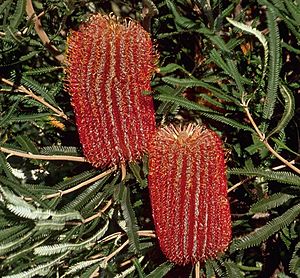List of rare flora of the Warren region facts for kids

The Warren region in southern Western Australia is a special place with many unique plants. Sadly, some of these plants are in danger of disappearing forever. This article tells you about the plants in the Warren region that are considered endangered. This means there are very few of them left, and they need our help to survive.
These plants are officially listed as "Declared Rare Flora" by the Department of Environment and Conservation. This important list helps protect them under a law called the Wildlife Conservation Act 1950.
Contents
What Are Endangered Plants?
Endangered plants are types of plants that are at a very high risk of becoming extinct, which means they could completely disappear from Earth. This happens when there are only a few of them left, or their homes (habitats) are being destroyed. When a plant is declared "rare" or "endangered," it gets special protection to help it survive and grow again.
The Warren Region: A Special Home for Plants
The Warren region is a unique area in Western Australia, known for its tall forests, especially the magnificent karri trees. It has a lot of rain and special soils, which create perfect conditions for many different kinds of plants to grow. Because of its unique environment, many plants found here don't grow anywhere else in the world. This makes protecting them even more important.
Why Are These Plants in Danger?
Plants become endangered for many reasons. In the Warren region, some of the main threats include:
- Habitat Loss: When forests are cleared for farms, towns, or roads, plants lose their homes.
- Climate Change: Changes in weather patterns, like less rain or more extreme heat, can make it hard for plants to grow.
- Diseases: Some plant diseases can spread quickly and wipe out entire groups of plants.
- Weeds: Plants that are not native to the area can outcompete and take over the space of native endangered plants.
- Bushfires: While some native plants are adapted to fire, very frequent or intense fires can harm sensitive species.
Meet the Endangered Plants of Warren
There are 28 types of plants in the Warren region that are currently listed as endangered. One of them, Leucopogon cryptanthus, is thought to be extinct, meaning it has already disappeared. The other 27 are still believed to be alive, but they are in great danger. Here are some of them:
- Asplenium obtusatum subsp. northlandicum
- Banksia brownii (Feather-leaved Banksia)
- Banksia verticillata (Albany Banksia)
- Boronia exilis
- Brachyscias verecundus
- Caladenia christineae
- Caladenia excelsa
- Caladenia harringtoniae
- Caladenia winfieldii
- Calectasia cyanea (Blue Tinsel Lily)
- Darwinia ferricola
- Diuris drummondii (Tall Donkey Orchid)
- Drakaea micrantha
- Dryandra nivea subsp. uliginosa
- Epiblema grandiflorum var. cyaneum (Blue Babe-in-a-cradle)
- Grevillea brachystylis subsp. australis
- Hydatella dioica (Swan Hydatella)
- Isopogon uncinatus
- Kennedia glabrata (Northcliffe Kennedia)
- Kennedia lateritia (Augusta Kennedia)
- Lambertia orbifolia subsp. Scott River Plains
- Meziella trifida
- Microtis globula (South-coast Mignonette Orchid)
- Reedia spathacea
- Sphenotoma drummondii (Mountain Paper-heath)
- Verticordia fimbrilepis subsp. australis
- Verticordia plumosa var. vassensis
How We Can Help Protect Them
Protecting endangered plants is very important for the health of our planet. When one plant species disappears, it can affect other plants and animals that rely on it. Here are some ways people are helping:
- Conservation Programs: Scientists and conservationists work to protect the places where these plants grow.
- Seed Banks: Seeds from endangered plants are collected and stored in special "banks" so they can be grown later if needed.
- Research: Learning more about these plants helps us understand what they need to survive and reproduce.
- Public Awareness: Teaching people about endangered plants helps everyone understand why they are important and how to protect them.
By understanding and caring for these special plants, we can help make sure they continue to thrive in the Warren region for many years to come.

